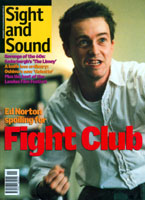Primary navigation

USA 1995
Reviewed by Richard Falcon
Our synopses give away the plot in full, including surprise twists.
Brooklyn, New York. The summer of 1993. Kenny Jones, amateur coach of a street basketball team called Kenny's Kings, leads his players through a season of community-organised al fresco tournaments. Jones works in a liquor store to pay for uniforms and support his family, which now includes the Kings' local-hero star, point-guard 'Booger' Smith, to whom Jones has been a surrogate father since Smith was thrown out by his mother. As the Kings comprise some of the best 18-and-under amateur ball players in New York, they progress smoothly to the late-summer playoffs. In the 'Soul in the Hole' playoff, they are just beaten during an edgy game in which the neighbourhood crowd threatens violence. At the end of the summer, while Jones looks for a new job, having been laid off by the liquor store, Smith goes off to college in Arizona. Jones discovers that Smith has dropped out of college and is back in the borough facing an armed- robbery charge. The two men do not see each other again but Jones hears that the charges against Smith have been dropped.
Soul in the Hole's director Danielle Gardner has worked for eight years in the UK making documentaries for Channel4 and the BBC, a career that is ironically apparent in this film's refusal to offer an authoritative perspective on its world. Mixing a predominantly observational mode with to-camera interviews with the protagonists, as did the earlier basketball documentary Hoop Dreams, Soul takes Gardner, a white female New Yorker, to the predominantly black and male milieu of the street basketball courts of the Brooklyn neighbourhood Bedford Stuyvesant. The result is undeniably exciting but also ultimately frustrating.
'Bed Stuy' might be on Gardner's doorstep, but her film grew apparently out of a pop-anthropologist's fascination with New York street basketball, with what she describes as its "particular customs" and, perhaps a little tellingly, "its colourful vernacular". From this initial excitement at discovering a subculture, Gardner's film is determined to maintain its street cred by anchoring itself to two characters.
The first is amateur coach Kenny, a loquaciously volatile family man and local celebrity in an environment which offers few other non-criminal means of achievement. The second is, more problematically, 'Booger' Smith, Kenny's informally adopted "son" and Kenny's Kings' most gifted player. Kenny is a gift to a fly-on-the-wall team, fiercely competitive and unselfconscious in expressing his emotions, an ebulliently macho bear of a man who collapses into tears when, inexplicably, many of his players fail to show at an important playoff. If the movie's true heart and soul is in its exhilaratingly filmed games - showcasing some fast breaks and stutter steps by cinematographer Paul Gibson - what narrative it has to offer revolves around Kenny's relationship with 'Booger'. Three desires clash here: Kenny says he wants to "civilise" him, to save him from the temptations of his street celebrity and his own unpredictable energies; 'Booger' says he wants money for a Lexus and will get it either through making it to the NBA or through drug deals; and the film's director wants 'Booger' to epitomise the dangerous cutting edge of the street culture.
What happens as a consequence is that 'Booger' is placed centre stage for us, but unfortunately we never really get to know him. If Spike Lee's recent He Got Game gave us some industrial-strength mythmaking around basketball, Soul in the Hole, whether intentionally or not, ends up offering us 'Booger' as any self-respecting rebel-without-a-cause teenager would like to present himself: inscrutable, moody, dangerous and doomed.
At the end of Soul in the Hole we learn that 'Booger' has dropped out of college and attracted an armed-robbery rap. Then a peculiar coda appears. The subsequent basketball records of other members of Kenny's Kings are flashed up on the screen in a barrage of affirmation and we realise that these shadowy figures in the film have gone on to rule the world of big-time basketball. It provides a tacked-on feelgood ending but leaves us wondering whether the focus on 'Booger' has been much more than a style statement. After all, 'Booger' has apparently either chosen his own lack of success, by indulging his rebellious temperament, or is the genuine victim of his own unmet needs. At points like these, with an absence of information on the screen, we yearn for some unfashionable voice-of-God intervention by the film-makers, who have, after all, spent more time with these characters than we have.
If the movie leaves the surfaces of the lives it touches barely skimmed, it does succeed in entertaining us without recourse to the kind of sensationalism lesser film-makers might have indulged. There is relatively little focus on street drugs culture. Similarly, violence is bracketed out. It lurks in the background and is visible through Kenny's panicked realisation that a playoff in another neighbourhood is in danger of ending with gunplay and in a comment by a friend of Kenny's after he has exploded at a referee that his behaviour sets a bad example - "We are trying," says the friend, "to stop these kids from shooting each other on the drop of a dime." Gardner instead shows us Kenny's players at a barbecue shooting each other with water pistols.